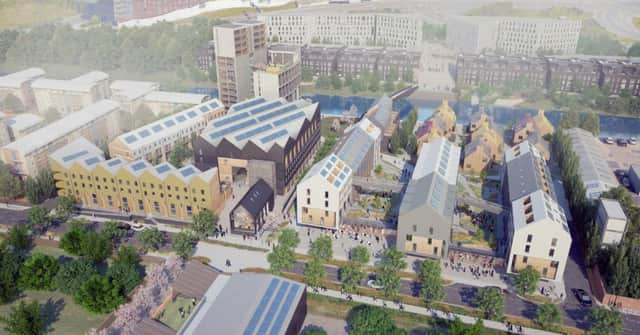Can green living thrive in Leeds city centre?


Citu’s Climate Innovation District, which forms part of the plans to regenerate the South Bank of Leeds, will harness technology to deliver 530 low-carbon homes alongside environmentally-friendly manufacturing, leisure and office developments. The Climate Innovation District aims to collaborate with local and international partners to deliver a model of how to build “zero-carbon” neighbourhoods that also provide healthier, smarter and better connected cities.
Following years of research with Leeds Beckett University, Citu has developed the Citu House, a timber-framed housing system, which is designed to meet the highest environmental standards, and is manufactured by the developer at its factory in Leeds.
Advertisement
Hide AdAdvertisement
Hide AdChris Thompson, the managing director and founder of Citu, is passionate about changing the way cities are developed to reduce energy consumption in buildings and transport.


He is a member of the Leeds Climate Change Strategy Board, which is looking at ways in which the council and its partners can improve the environment through reduced carbon emissions across the city.
The homes in the Climate Innovation District will be made on site at Citu Works; a manufacturing facility that will produce a timber frame housing system. The 80,000 sq ft facility has the capacity to produce up to 750 low-carbon homes each year, as well as providing a base for Citu in the heart of the Climate Innovation District.
At Citu Works, building work will not be hampered by bad weather, which reduces production times and costs. It will enable high-quality, low-energy and affordable homes to be manufactured with precision on an assembly line and then installed on site.
Advertisement
Hide AdAdvertisement
Hide AdCitu Works will be open to the public and will offer an “Experience Centre” which details the impact of climate change and how to change cities.


A Citu spokesman said: “The collaboration with Leeds City Council, Leeds Beckett and University of Leeds and Swedish architect White Arkitekter, who have been behind many of the progressive new neighbourhoods in Scandinavia, make this development unique. The Climate Innovation District, and in particular South Bank Leeds, presents an enormous opportunity for Leeds to be the first city in the UK, and possibly Europe, to create an ecologically pioneering district of this scale.”
The homes will be a mix of ‘family’ houses which use substantially less energy than conventional homes. They will be connected to smart districts that control and monitor district energy systems.
Citu believes that the community that lives in a neighbourhood are the best people to own and control the freehold, the utilities infrastructure and public spaces.
Advertisement
Hide AdAdvertisement
Hide AdUnder Citu’s plans, residents will have control of their energy with help from a “My Citu” app, which can be accessed from a desktop, tablet or smartphone to remotely control everything from lighting to heating of the homes at the touch of a button. The houses will also collect rainwater as part of a sustainable integrated urban drainage system. They will be fitted with solar panels and a specialist mechanical ventilation with heat-recovery system.
The £125m scheme is a key part of the city’s development plans for the South Bank, one of the most ambitious regeneration projects in Europe.
The Citu spokesman said: “Straddling the River Aire, a key element of the Climate Innovation District will be the installation of a new pedestrian bridge across the river that will create a much-needed link for residents.
“The district also represents the first family homes being developed in Leeds city centre for more than 90 years, and supports the development of a strong local community that will be essential to the success of South Bank Leeds.”
Advertisement
Hide AdAdvertisement
Hide AdCitu Works, where the homes will be made, will bring manufacturing back to the city centre, creating over 40 jobs.
The first residential phase of the Climate Innovation District is being funded by a loan of £7m from the Leeds City Region Revolving Investment Fund (RIF), which was established by a partnership of seven Yorkshire local authorities. The fund is designed to support projects which accelerate economic growth and job creation in the Leeds City Region. In addition, Citu is investing £3m into Citu Works. This facility has been supported by a £400,000 grant from the Leeds City Region Enterprise Partnership (LEP).
Some of the principles supporting the scheme have already been incorporated into Citu’s Little Kelham development in Sheffield. The development, which started on site in 2013, features 250 low-carbon homes which blend modern, energy-efficient buildings with the existing architecture, some of which is listed. The Citu Houses at Little Kelham are also digitally-enabled, allowing residents to control and monitor energy usage from a smartphone or tablet.
“Many of the homes at Little Kelham have been sold off-plan, which is proof that more people than ever are aware of their impact on the environment and want to reduce this,’’ the spokesman added.
Advertisement
Hide AdAdvertisement
Hide Ad“The Climate Innovation District takes Citu’s approach to the next level, and will be the first time that Citu has designed and built a whole community from the ground up, and will be the first to use the houses put together in the Citu Works factory.
“Citu Works will have the capacity to produce up to 750 low-carbon homes each year for further Citu development in Yorkshire and beyond.”
“The factory is now complete and operational and the first prototype home will be completed in March this year. The first residents are expected to move in by August 2017 and the development is estimated to take around five years to complete.”
It will also boost Leeds City Council’s ambition to reduce CO2 emissions by 80 per cent by 2050. In the longer term, Citu hopes that developers, housebuilders and the wider industry will visit its Experience Centre at Citu Works to learn more about its ethical approach to sustainable living.
“By creating a viable economic model using the latest technology and innovation from across the world, Citu aims to create solutions that outlast our generation, and the next.”